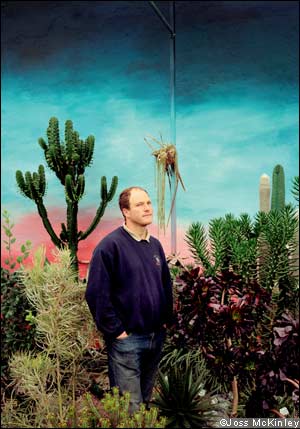
那是在2000年3月份,我和我的朋友保罗(Paul)正在位于巴拿马-哥伦比亚边界的达连地堑(Darién Gap)寻找稀有植物物种。两位哥伦比亚导游刚刚带我们进入一片林间空地。对于我这位园艺爱好者来说,这是地球上最神奇的地方。突然,几个青年人冒了出来,手里挥舞着手枪。他们将我们撂倒在地,然后绑了起来。我们的导游被拖入了灌木丛中,从此以后,我们就再无他们的音讯。
劫持者审问了我们好几个小时,一会儿指控我们是中情局(CIA)情报员、运毒者,一会儿又指控我们是英国间谍。我不停地告诉他们,我是一名正在寻找兰花的园艺爱好者,保罗是一名登山运动员,但他们就是不信。这只是开始。接下来的9个月,我们先后被关押在边境上的一系列营地里面。在其中的许多营地,我都建了园圃,仅仅是想让自己保持头脑清醒;我本想开辟出一片菜地,或者种点玉米。他们常常恐吓我们,踢我们几脚或给我们几拳。他们不会说英语,我们之间的对话仅限于,感谢他们给我们犰狳当晚饭。
他们逼我们给父母写字条索要赎金——500万美元。但他们没有与外部世界联系的方式,所以,那些字条一直没有被送出。
他们会时不时地威胁杀我们,所以我们放弃了活着出去的希望。这令我们非常痛苦,但正因为如此,我才有了建一座“世界花园”(World Garden)的想法。一天,一个孩子——我们叫他“刀疤脸(Scarface)”,因为他脸上有一个巨大的疤痕——告诉我们,当天要处死我们。他一离开,我就开始在日记里匆忙写下我的想法,设计如何在我家Lullingstone Castle的庭院里建一座花园。我希望展示英国的植物与花卉都来自哪里。
我现在还留着那本日记——那些图画难以辨认,因为我的手抖得太厉害。
我设计的花园有好几个巨大的花坛——每一个花坛的形状都按照其中种植的植物与花卉所来自的大陆建造。例如,代表南美州的花坛中会囊括所有源自那里的英国植物与花卉。人们没有意识到,英国大约80%的植物都来自海外。它们是由维多利亚时代的植物采集者,在环游世界后带回的植物枝条繁衍而来。
他们那天没有杀我们。最后,我们把他们给逼疯了。我们没有做什么特别的事——我只是跟他们大谈特谈兰花。保罗不停地抱怨,也让他们很是厌烦。他们释放我们的那天非常离奇;他们再也受不了了,勒令我们离开,还把9个月前从我们身上搜走的东西又还给了我们,包括护照、帆布背包、价值3500美元的旅行支票。
问题是,我们在沼泽地里迷了路,于是不得不重新折回。他们派了一名导游带我们出去,不停地说:“我们讨厌你们;快滚!”
最终,我们回到了文明社会,并与英国大使馆取得了联系。起初,他们不相信我们——他们以为我们已经死了,但我们终于乘飞机回到了英国。刚回到家,我休息了一段时间,然后便开始建造世界花园。Lullingstone Castle自1361年起就一直为我的家族所有,但保养它非常耗钱。我们将花园向公众开放,现在每年有1万人来参观,所以可以维持城堡的运转。别的不说,仅此一点,我还要谢谢“刀疤脸”。
最早的植物采集探险记录可追溯到公元前1495年。当时,埃及女王哈特谢普苏特(Hatshepsup)派植物学家去索马里寻找土沉香(incense tree)。维多利亚时代的植物学家罗伯特•福琼(Robert Fortune)化装成中国农民,将茶树枝条偷运至印度,使英国在茶叶贸易中占据了统治性地位。兰花在1818年来到英国——植物学家威廉•斯文森(William Swainson)从巴西往家里寄了一个盒子,把这种植物当作填充物。这些兰花开了花,后来变得极其流行。
译者/董琴
http://www.ftchinese.com/story/001035624

It was March 2000 and I was with my friend Paul in the Darién Gap on the Panamanian-Colombian border looking for rare plant species. We had just entered a clearing with our two Colombian guides. For me as a gardener, it was the most amazing place. Suddenly several teenagers appeared brandishing guns – they threw us to the ground and tied us up. Our guides were dragged off into the bushes; we never heard from them again.
Our captors interrogated us for several hours, accusing us of being variously CIA, drug-runners and British spies. I kept telling them that I was a gardener looking for orchids and Paul was a mountaineer, but they wouldn’t have it. That was the beginning. For the next nine months we were held hostage in a series of camps on the border. In many of them I built a garden, just to keep myself sane; I’d plant a vegetable patch or grow some corn. They often threatened us, giving us the odd kick or punch. They couldn’t speak English and conversation was restricted to us thanking them for the armadillo we had for supper.
They made us write ransom notes to our parents – they wanted $5m. But they had no means of communication with the outside world so the notes were never sent.
Every so often they threatened to kill us, which is why we were given up for dead. It was pretty traumatic, but it’s how I came up with the idea for the World Garden. One day this kid – we called him Scarface because of a huge scar he had on his face – told us we were going to be killed that day. As soon as he left, I started scribbling an idea in my diary. It was for a garden I would create in the grounds of my home back in England – Lullingstone Castle. My idea was to show where all the plants and flowers in Britain come from.
I still have the diary – the drawings are barely legible as my hand was trembling so much.
I designed a garden with several large flower beds – each one in the shape of the continent the plants and flowers had come from. For example, there would be a bed representing South America that would contain all the plants and flowers growing in the UK that originally came from there. People don’t realise that about 80 per cent of our plants come from abroad. It stems from the Victorian plant-hunters who travelled the world bringing back plant cuttings.
They didn’t kill us that day. And in the end we drove them mad. We didn’t do anything in particular – I just talked about orchids a lot. And Paul’s continual complaining didn’t go down well either. The day they released us was surreal; they couldn’t take it any more. They just told us to leave. They gave us everything they had taken from us nine months earlier: passports, rucksacks and $3,500 worth of travellers’ cheques.
The problem was, we got lost in swampland and had to go back. They got a guide to lead us out: they kept saying, “We hate you; please go!”
Eventually we found civilisation and contacted the British Embassy. At first they refused to believe us – they thought we were dead – but in the end we were flown home. When I got back, I rested. Then I started work on the World Garden. Lullingstone Castle has been in our family since 1361 and its upkeep was crippling. We opened the garden to the public and now have 10,000 visitors a year, so it keeps the estate going. And for that, if nothing else, I thank Scarface.
The earliest recorded plant-hunting expedition was in 1495BC when Egypt’s Queen Hatshepsup sent botanists to Somalia in search of incense trees. The Victorian botanist Robert Fortune disguised himself as a Chinese peasant to smuggle tea plant cuttings to India, giving Britain dominance in the tea trade. Orchids came to Britain in 1818 when botanist William Swainson sent home a box from Brazil, using the plants simply as packing material. The orchids flowered and became hugely fashionable.
没有评论:
发表评论